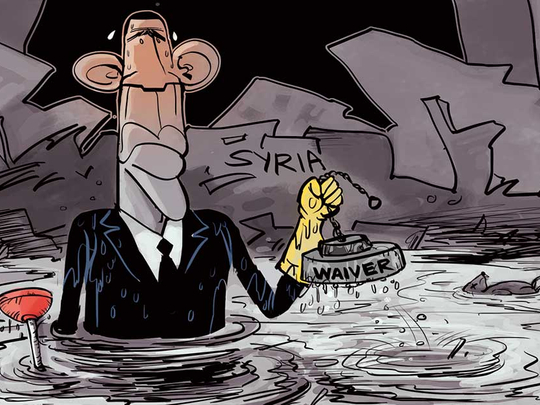
Deemed “essential to the national security interests” of the United States, Thursday’s announcement from the White House to the effect that President Barack Obama has waived various sections of the Arms Control Act to facilitate the export of weapons to “foreign forces, irregular forces, groups or individuals engaged in supporting or facilitating ongoing US military operations” in Syria is nothing less than an nth-minute face-saving exercise.
Its implementation will only serve to prolong the carnage and further escalate tensions in what has evolved into a muscle-flexing contest between the US and Russia at a heart-rending cost to the civilian population yearning for a return to some semblance of a normal life.
Former Pentagon official Michael Maloof told RT that included in the arms on offer are likely portable Manpads, air-defence systems, easily able to shoot down warplanes, which “could put us [the US] in direct jeopardy and result in a direct confrontation with the Russians.”
“Obama just said, ‘I’m washing my hands of this; I’m out of here anyway’,” is Maloof’s take on this unexpected development that could thwart the newcomer’s policies by placing Washington at serious odds with Moscow.
“Wouldn’t it be nice if we got together with Russia and knocked the hell out of [Daesh],” said Donald Trump on the stump, causing alarm among America’s closest allies. Of course, that apparent off-the-cuff remark may not become President Trump’s policy once he finds time to get a handle on intelligence briefings and to mull advice from his security, State Department and defence teams.
However, if rebels armed with sophisticated ‘Made in the USA’ weapons start shooting down Russian jets, his choice may be made for him.
Indeed, the question is why now when the territories under the control of anti-government rebels and terrorist groups are fast diminishing and Obama’s soon-to-be successor has made it clear that his administration will align with Russia to cleanse Syria of Daesh [the so-called Islamic State of Iraq and the Levant) and other groups of a similar barbaric ilk?
With just weeks to go before the removal vans arrive, what has promoted Obama to take this step as a lame-duck president, especially when over this five-year-long conflict, opposition fighters trained by the CIA and the Pentagon were literally begging for bullets, let alone heavy weapons, a situation that encouraged many to join up with better-armed radical groups to the extent those programmes were dumped?
If Obama could wield his waiver with such ease, why didn’t he use it years ago when the opposing side still had the upper hand on the battlefield before Russia entered the fray, instead of his 2013 executive decision enabling US weapons to be transferred to a select, vetted few?
Pacifying allies?
This latest thrust on the outgoing president’s part may be geared towards increasing America’s dwindling leverage when and if the time comes to negotiate a political settlement. It could also be a sop to his critics alleging his administration encouraged rebel fighters to believe they had solid US backing only to find themselves dropped in the proverbial when Obama reneged on his own ‘chemical weapons’ red line.
Alternatively, it could serve as a token, a message that the US remains on side, aimed at pacifying America’s friends, including those in the Arab World, dismayed at Bashar Al Assad’s, albeit premature, victory dance with some pointing a finger at Obama for being afraid to jump in with both feet to curtail the slaughter of hundreds of thousands.
The White House would have us believe that waivered weapons are destined to aid Arab and Kurdish fighters attempting to drive Daesh out of its de facto capital Raqqa, which if true won’t go down very well with Ankara that views Kurdish ambitions for a state hugging Turkey’s borders as the country’s foremost threat.
US Secretary of Defence Ash Carter has announced with great fanfare that 200 American military personnel will expand the efforts of 300 already in country to aid Raqqa’s capture. Doesn’t seem like much of a cavalry to me!
Carter has bristled over complaints that more could have been done, firing back at regional state actors for their lack of meaningful involvement.
Obama has had five long years to make a difference. Anything he comes up with now only muddies the waters. His legacy on Syria cannot be salvaged. It will weigh as heavily on him as Bill Clinton’s lack of action to stem the Rwandan genocide for which he apologised. The sooner Obama comes to terms with his failures and goes on his way, the better for all concerned.
Linda S. Heard is a specialist writer on Middle East affairs. She can be contacted at lheard@gulfnews.com









